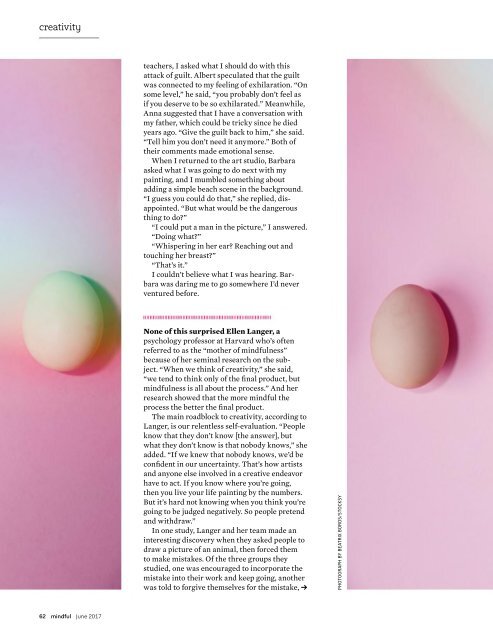Mindful June 2017
Create successful ePaper yourself
Turn your PDF publications into a flip-book with our unique Google optimized e-Paper software.
creativity<br />
teachers, I asked what I should do with this<br />
attack of guilt. Albert speculated that the guilt<br />
was connected to my feeling of exhilaration. “On<br />
some level,” he said, “you probably don’t feel as<br />
if you deserve to be so exhilarated.” Meanwhile,<br />
Anna suggested that I have a conversation with<br />
my father, which could be tricky since he died<br />
years ago. “Give the guilt back to him,” she said.<br />
“Tell him you don’t need it anymore.” Both of<br />
their comments made emotional sense.<br />
When I returned to the art studio, Barbara<br />
asked what I was going to do next with my<br />
painting, and I mumbled something about<br />
adding a simple beach scene in the background.<br />
“I guess you could do that,” she replied, disappointed.<br />
“But what would be the dangerous<br />
thing to do?”<br />
“I could put a man in the picture,” I answered.<br />
“Doing what?”<br />
“Whispering in her ear? Reaching out and<br />
touching her breast?”<br />
“That’s it.”<br />
I couldn’t believe what I was hearing. Barbara<br />
was daring me to go somewhere I’d never<br />
ventured before.<br />
None of this surprised Ellen Langer, a<br />
psychology professor at Harvard who’s often<br />
referred to as the “mother of mindfulness”<br />
because of her seminal research on the subject.<br />
“When we think of creativity,” she said,<br />
“we tend to think only of the final product, but<br />
mindfulness is all about the process.” And her<br />
research showed that the more mindful the<br />
process the better the final product.<br />
The main roadblock to creativity, according to<br />
Langer, is our relentless self-evaluation. “People<br />
know that they don’t know [the answer], but<br />
what they don’t know is that nobody knows,” she<br />
added. “If we knew that nobody knows, we’d be<br />
confident in our uncertainty. That’s how artists<br />
and anyone else involved in a creative endeavor<br />
have to act. If you know where you’re going,<br />
then you live your life painting by the numbers.<br />
But it’s hard not knowing when you think you’re<br />
going to be judged negatively. So people pretend<br />
and withdraw.”<br />
In one study, Langer and her team made an<br />
interesting discovery when they asked people to<br />
draw a picture of an animal, then forced them<br />
to make mistakes. Of the three groups they<br />
studied, one was encouraged to incorporate the<br />
mistake into their work and keep going, another<br />
was told to forgive themselves for the mistake, →<br />
PHOTOGRAPH BY BEATRIX BOROS/STOCKSY<br />
62 mindful <strong>June</strong> <strong>2017</strong>


